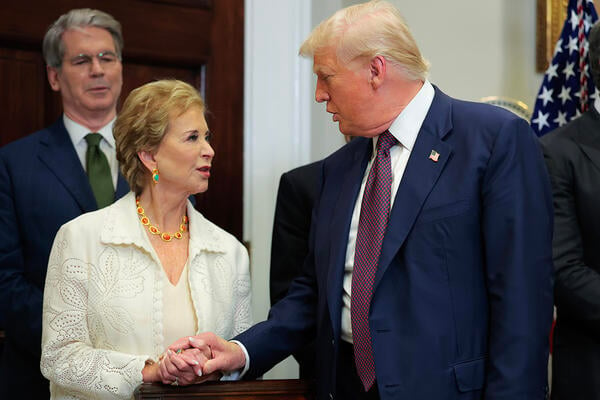
New Dept. of Ed Rule Limits Public Service Loan Forgiveness
Proposed changes to a key student loan forgiveness program could lead to thousands of borrowers losing access, institutional lobbyists and student advocates say. In their view, the new policy would unfairly tie an individual’s eligibility for Public Service Loan Forgiveness to the policies of their employer and whether they match with President Trump’s priorities.
Department officials, however, describe the revised regulations as a way to prevent taxpayer dollars from being “improperly provided” to borrowers whose employers are engaging in what they consider “illegal” practices, according to a news release about the rule. These include gender-affirming care; diversity, equity and inclusion programs; supporting “terrorists” in Palestine; or assisting undocumented immigrants.
“This feels like government overreach—organizations and groups that are not working in line with the administration’s agenda are going to be targeted by this regulatory change,” said Sabrina Calazans, executive director of the Student Debt Crisis Center. “We’re deeply concerned this is essentially going against free speech.”
The rule, which was published Monday on the Federal Register, fulfills a White House executive order signed by the president in March. The department reviewed the planned changes with an advisory committee through a complex process known as negotiated rule making earlier this summer. The version posted to the Register is very similar to an initial draft obtained in June as well as the final version committee members voted on—though that panel didn’t unanimously sign off on the revisions.
Under the department’s proposal, borrowers pursuing public service careers in local or state government as well as private nonprofit organizations could lose eligibility for loan forgiveness if their employer partakes in what the department are calling activities with a “substantial illegal purpose.”
The definition of said illegality is broad and can include: aiding or abetting violations of immigration laws, supporting terrorism, providing gender-affirming care, or participating in protests that involve trespassing or disorderly conduct. It also references violating federal discrimination laws like the Civil Rights Act of 1964, the Americans With Disabilities Act and the Age Discrimination in Employment Act of 1967. (Although the rule does not explicitly reference Trump’s executive orders and guidance against diversity, equity and inclusion, they are not explicitly excluded from consideration, either, sources say.)
Employers can be identified as ineligible through court rulings, a guilty plea or a settlement, but the department can also deem an organization ineligible using a preponderance-of-evidence standard, according to the department’s proposal. Organizations can appeal, but the department doesn’t outline what that process will entail, raising questions about whether it will meet due process standards. Individual borrowers will not be able to request reconsideration.
Under the PSLF program, borrowers can see their debts forgiven after making payments for 10 years while working for a qualified employer. More than one million borrowers have seen relief from the program since the Biden administration made it easier to access.
According to the proposal, the department expects to save roughly $1.5 billion by narrowing eligibility for PSLF. (Department officials haven’t said how long it will take to realize those savings.) The department stressed in its statement and throughout the draft rule that it’s designed to exclude groups that focus on certain social issues or ideologies.
Public comment is now open until Sept. 17. After that, if the rule is finalized, it would take effect July 1, 2026. The regulations would not be retroactive, so all PSLF credit gained prior to that date would be protected regardless of an employer’s new status.
Education under secretary Nicholas Kent said in a statement that the policy is the proper response to “a historic mandate” from the president to support public servants who “strengthen their communities and serve the public good,” rather than benefiting bad businesses.
“The federal government has a vital interest in deterring unlawful conduct,” he added. “We’re moving quickly to ensure employers don’t benefit while breaking the law.”
But student borrower advocates, like Calazans, worry the policy’s effects will be far more sweeping than punishing a limited number of issue-specific nonprofits.
“We’re also thinking about the impact that this will have on state and local government employees, specifically for states that are sanctuaries,” Calazans said, referencing municipalities that limit cooperation with federal immigration authorities. If all employees of that city or state are no longer eligible for loan forgiveness, “this change in regulation could effectively impact millions of Americans across the country.”
Betsy Mayotte, president and founder of the Institute of Student Loan Advisors, served on the advisory committee that reviewed the revisions and was the only member to vote against the final draft. Mayotte and others worry it will have a chilling effect and drive graduates away from low-paying, high-demand careers.
Calling the proposal arbitrary, she said it essentially gives the Trump administration the power to define public service as it sees fit. She also noted that while individual borrowers may not handle tasks with a “substantial illegal purpose,” they may lose access to federal aid if other staff members do.
“I’m already seeing borrowers in a panic and wondering if they should leave their jobs because they work at a hospital that—even though it’s legal—performs gender-affirming care. They’re worried about whether they’re going to have PSLF eligibility and wondering if they need to change their employers,” she explained. “Or there’s people like public defenders who might be assigned a case or about someone who may or may not be an illegal immigrant. Will that public defender’s office lose their eligibility because of that?”
Mayotte said the department told her there is a way to address that concern and carve out specific parts of large institutions and organizations as ineligible while protecting others. But she remains skeptical of how that can be done.
Emmanual Guillory, senior director of government relations at the American Council on Education, a lobbying group for colleges and universities, said these new regulations defy Congress’s original intentions for the program.
Established in 2007 with bipartisan support under President George W. Bush, the PSLF program was designed to encourage students to pursue careers in public service. Guillory believes the original intent was about the type of work, not whom the employer was.
“It was the intent of Congress to really focus on students, to ensure that students are able to receive loan forgiveness after 10 years of repayment and to define what type of jobs would constitute that,” he said. Now, “if the focus becomes more on the qualifying employer, then the potential employees would likely not choose to enter into this type of work,” he added. “That seems to be a disservice to the actual employees.”
As a result, college programs that focus on public service roles may struggle to recruit both students and staff, and employers will face shortfalls as a result, Guillory added.
Mayotte and others anticipate that the rule will receive significant pushback through the public comment period. Additionally, if the rule is finalized, it could face legal challenges similar to the administration’s other higher education policies.
“Regulations cannot be in violation of federal statute. And if you go in and read the PSLF statute, it’s particularly for government employers and 501(c)(3) entities. There’s no if, ands, buts or maybes in that language,” Mayotte said. So “I expect that there will be litigation around it.”
Source link


